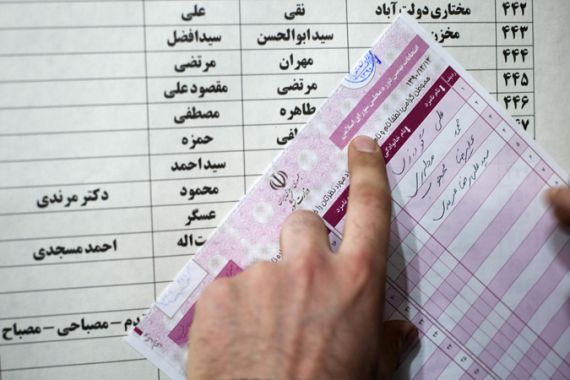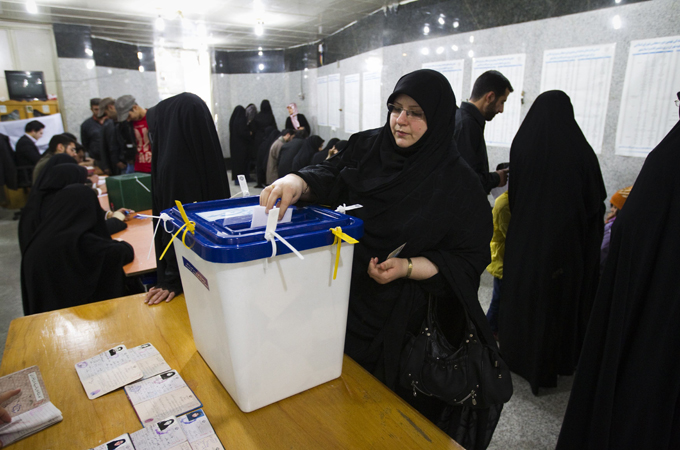Iran election’s initial results trickle in
Government claims 65 per cent turnout in poll for country’s 290-member legislative assembly.

 |
| Authorities kept polls open for five extra hours in order to allow for more voters to cast their ballots [Reuters] |
Early unofficial results have begun to come in after Iranians finished voting in parliamentary elections for the country’s 290-seat assembly, with state media reporting major wins for supporters of Ayatollah Ali Khamenei, Iran’s supreme leader.
Authorities delayed the end of voting on Friday by five hours in order to allow more people to cast their ballots, with polling stations shutting down at 11:00pm local time (19:30 GMT). Iranian state media says the turnout in the poll was 65 per cent nationwide, up about ten per cent from the last such elections in 2008.
The Islamic Republic’s conservative leaders called on people to vote in legislative elections for the “security of the country”, while reformists who accused authorities of fraud in 2009 called on their supporters to boycott.
Al Jazeera’s Zeina Khodr, reporting from Tehran, said the vote was being seen as a referendum on President Mahmoud Ahmadinejad’s rule.
“[The vote] is more of a referendum than an election because voter turnout [is key],” she said from a polling station as the day’s voting wrapped up.
Ahmadinejad’s legitimacy was dealt a blow after protests following his re-election in 2009, when opponents said there was widespread voter fraud.
No independent observers were on hand to monitor the voting or check the turnout figures in the current poll. International rights groups have criticised the state for increasing restrictions on freedom of expression and disqualifying many opposition candidates ahead of the poll.
Manual counting
Ballots are being counted manually, and full results may take up to three days to tabulate. Initial media reports suggested that Ahmadinejad rivals had won in several constituencies.
The semi-official Mehr news agency reported that Parvin Ahmadinejad, the president’s sister, failed to secure a seat in the parliament. She was running from the central town of Garmsar, the home-town of Ahmadinejad.
Pro-reform candidate Mohammadreza Tabesh was elected from the birth place of moderate former president Mohammad Khatami.
Ali Larijani, the current speaker of parliament, has retained his seat in Qom, according to initial results.
Results in major cities like Tehran have not yet been announced.
Iran faces economic turmoil, with high unemployment and inflation, compounded by Western sanctions over a disputed nuclear programme.
The vote is being seen as a contest between the United Front of Principalists, who support Supreme Leader Khamenei, and the Resistance Front, which backs Ahmadinejad.
“Whenever there has been more enmity towards Iran, the importance of the elections has been greater,” Khamenei, 72,
said after casting his vote in front of television cameras.
“The arrogant powers are bullying us to maintain their prestige. A high turnout will be better for our nation … and for preserving security.”
With the absence of the reformist coalition from the race, analysts believe the election has turned into a contest between factions within the increasingly divided conservatives.
Khodr said that the people turning out to vote are the ones “who support the Iranian establishment and leadership”.
Opposition boycott
The vote will probably have little impact on Iran’s foreign or nuclear policies, on which Khamenei already has the final say, but could strengthen the Supreme Leader’s hand before the presidential vote next year. Ahmadinejad, 56, cannot run for a third term.
“Of course, there are those who are boycotting the whole process altogether,” Al Jazeera’s Khodr said. “They support the Green movement, the reformists, [who] aren’t fielding any candidates in this election.”
Iranian opposition leaders and former presidential candidates Mir-Hussein Mousavi and Mehdi Karroubi have both been under house arrest for over a year. Other reformists have called for a boycott, leaving the pool of 3,400 candidates mostly to the conservatives.
Mohammad Khatami, a former president and an Ahmadinejad opponent, had earlier called for the freeing of all political prisoners before he participated in elections. He did vote in the election, despite that demand not being met.
Reyhane, 25, and an opposition supporter, told the AFP news agency: “The outcome is predetermined. It’s of no difference if I vote or not. I learned this from the previous election, when our votes were stolen.”
While the results will not have much impact on foreign policy, they may go some way in determining the balance of power between the camps loyal to Khamenei and Ahmadinejad.
“The parliament has been traditionally very critical of Ahmadinejad. It is very important for this president to maintain some sense of power over the legislative body in his last year in office,” our corrrespondent said.